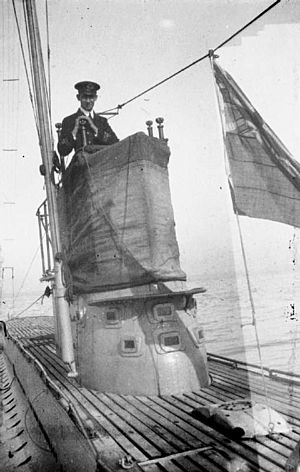Richard Sandford facts for kids
Quick facts for kids
Richard Sandford
|
|
|---|---|

On the bridge of HMS C3
|
|
| Born | 11 May 1891 Cathedral Close, Exeter, Devon |
| Died | 23 November 1918 (aged 27) Eston Hospital, Yorkshire |
| Buried |
Eston Cemetery
|
| Allegiance | United Kingdom |
| Service/ |
Royal Navy |
| Years of service | 1904–1918 |
| Rank | Lieutenant |
| Commands held | HMS C3 HMS G11 |
| Battles/wars | First World War |
| Awards | Victoria Cross |
| Relations | Brigadier Daniel Sandford (brother) |
Richard Douglas Sandford (born May 11, 1891 – died November 23, 1918) was a brave officer in the Royal Navy. He received the Victoria Cross, which is the highest award for courage given to British and Commonwealth soldiers. This special medal is given for incredible bravery when facing an enemy.
Contents
Richard Sandford was born in Cathedral Close, Exeter, Devon. His father was Ernest Grey Sandford, a church leader. Richard also had a brother named Daniel Sandford, who became a brigadier in the army.
Richard went to Clifton College for his education. After school, he joined the Royal Navy. He began his service in 1904. He quickly rose through the ranks.
Heroic Actions at Zeebrugge
By the time he was 26 years old, Richard Sandford was a lieutenant. He was in charge of a submarine called HMS C3. This was during the First World War.
In April 1918, Lieutenant Sandford took part in a very important mission. It was called the Zeebrugge Raid. The goal was to block a German naval base in Zeebrugge, Belgium. This would stop German submarines from leaving the port.
The Zeebrugge Raid Mission
On the night of April 22-23, 1918, Lieutenant Sandford had a dangerous task. He had to guide his submarine, HMS C.3, right into the enemy harbor. His mission was to blow up a long bridge-like structure. This structure connected the main part of the harbor (the Mole) to the shore.
He carefully steered his submarine. He placed it exactly between the support pillars of the bridge. This was a very risky move. He could have used a special steering system to leave the submarine from a safer distance. But he chose to stay closer. He wanted to make sure his mission was a complete success.
After placing the submarine perfectly, he set a fuse to detonate it. Then, he and his crew left the submarine. The explosion successfully destroyed the bridge. This helped to block the harbor.
Receiving the Victoria Cross
For his incredible bravery and skill during the Zeebrugge Raid, Richard Sandford was awarded the Victoria Cross. This medal showed how courageous he was.
Later Life and Legacy
After his heroic actions, Richard Sandford continued his service. He later commanded another submarine, HMS G11.
Sadly, Richard Sandford died on November 23, 1918. He passed away from typhoid fever in a hospital in Eston, North Yorkshire. This was just 12 days after the end of the First World War. The day before he died, his last submarine, HMS G11, was wrecked on rocks.
Today, Richard Sandford's Victoria Cross is on display. You can see it at the Britannia Royal Naval College in Dartmouth. It reminds everyone of his amazing courage and sacrifice.
 | William Lucy |
 | Charles Hayes |
 | Cleveland Robinson |

